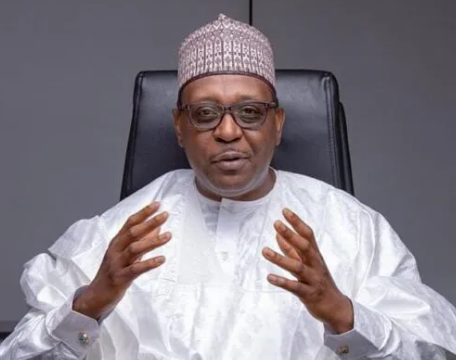Share!
Nigeria Increases 2025 HIV Response Fund – Pate
Nigeria is making notable progress toward achieving the global target of ending HIV/AIDS by 2030 through a series of comprehensive and ambitious initiatives, the Coordinating Minister of Health and Social Welfare, Prof. Ali Pate, has said.
Speaking at a virtual World AIDS Day Media Roundtable organized by the Global Fund, Pate outlined key strategies aimed at combating the disease, stressing the adoption of the Sector-Wide Approach (SWAp) to streamline resources and enhance accountability across national and sub-national levels.
“This approach ensures accountability and establishes robust reporting and monitoring systems,” he said.
In addition, the Minister, who was represented by the Director General of the National Agency for the Control of AIDS (NACA), Temitope Ilori, said private sector engagement through the HIV Trust Fund has also been instrumental in mobilizing domestic resources, with major enterprises and philanthropists contributing to the fight.
The Minister revealed that a ₦1.3 trillion allocation to healthcare for 2025b has been proposed, marking a significant increase in funding, out of which ₦10 billion is earmarked for antiretroviral treatment and prevention, targeting support for at least 100,000 Nigerians living with HIV.
Additionally, he noted, the National Health Insurance Authority (NHIA) provides ongoing funding for vulnerable groups, including those affected by HIV, tuberculosis, and malaria, through a one-percent revenue contribution from the consolidated national fund.
According to the Minister, Nigeria is prioritizing the domestic production of HIV-related commodities, including condoms, antiretroviral drugs, and rapid test kits, to enhance sustainability, while adding that discussions are underway with pharmaceutical companies to establish production facilities, supported by government tax waivers on equipment.
Production is expected to commence by the end of 2025, contingent on meeting the World Health Organisation (WHO) prequalification standards, “This initiative aims to reduce dependency on foreign exchange and lower costs,” Pate said.
He said workforce development is another cornerstone of the strategy, with over 40,000 health workers trained this year and a target of 120,000 by 2025.
Furthermore, he said prevention efforts have also been intensified, with the Prevention of Mother-To-Child Transmission (PMTCT) program testing over four million pregnant women in 2023, surpassing expectations.
“We have mapped 40,000 health facilities offering HIV services to ensure broader access to care,” he explained.
He, however, noted that significant challenges remain, including stigma, discrimination, and the criminalization of key populations, “Stigma and discrimination deter people from accessing medication and care,” he said, stressing the importance of addressing these barriers.
Funding constraints at the sub-national level were also identified, though recent reforms granting autonomy to local governments offer hope for improved resource mobilization, he stressed.
Pate emphasized the critical role of data in ensuring accountability and effective planning, adding that efforts to improve data quality and digitize health records are part of the broader strategy to modernize Nigeria’s healthcare system.
“Reliable data enhances transparency and coordination with international partners,” the added, reaffirming Nigeria’s commitment to programmatic and financial sustainability.
He emphasised the need for more investment in prevention and treatment.
Peter Sands, the Executive Director of Global Fund warned of donor fatigue and risks posed by funding cuts, while emphasizing the need for more investment in prevention and treatment.
John Nkengasong, United States Global AIDS Coordinator for the U.S. President’s Emergency Plan for AIDS Relief (PEPFAR), highlighted the program’s support for local manufacturing in Africa, a key pillar for sustaining the HIV response and enhancing health security.
“We have committed to purchasing 15 million made-in-Africa HIV rapid tests and millions of antiretroviral doses, contingent on their meeting stringent regulatory and cost-effectiveness standards,” he said.
Nkengasong linked regional manufacturing to broader global health resilience, particularly in crises like COVID-19.
However, he noted challenges, including affordability and maintaining quality standards saying, “Cost remains a barrier for many. We must avoid premium pricing for locally manufactured products,” he warned.
According to him, a change of government would not affect PEPFAR, which has saved 26 million lives over 21 years, as it remains focused on its bipartisan mission.
UNAIDS Deputy Executive Director Christine Stegling emphasized the need to address stigma and discrimination, protect human rights, and ensure equitable access to treatment and prevention services.
She also stressed the importance of tackling structural barriers, such as debt servicing and revenue collection, to create sustainable healthcare systems.
The panellists collectively underscored the importance of sustainable funding, transparency, and accountability in combating HIV/AIDS.
They called for low- and middle-income countries to prioritize in-country funding mechanisms to mitigate donor fatigue and preserve the gains of the past 25 years.
They noted that it is crucial to ensure that communities have access to essential commodities and prevention services while judiciously managing resources to achieve maximum impact
